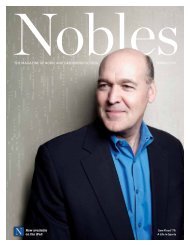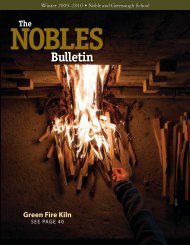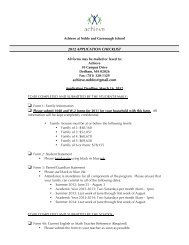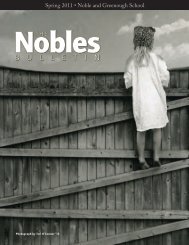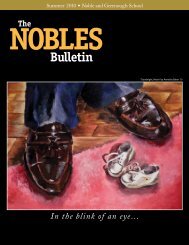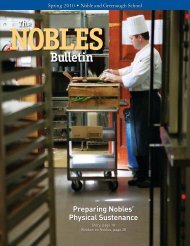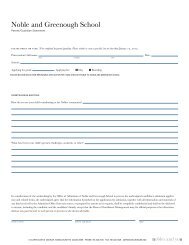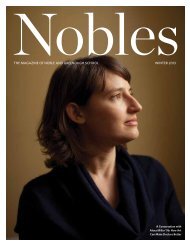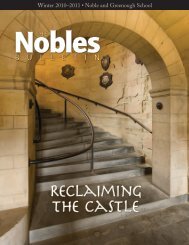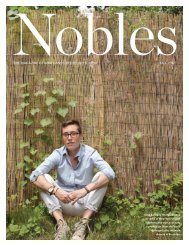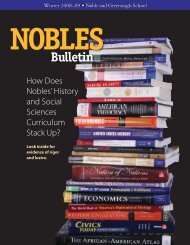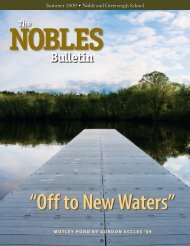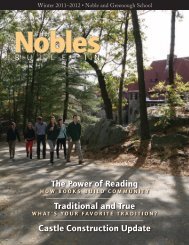B u l l e t i n - Noble and Greenough School
B u l l e t i n - Noble and Greenough School
B u l l e t i n - Noble and Greenough School
You also want an ePaper? Increase the reach of your titles
YUMPU automatically turns print PDFs into web optimized ePapers that Google loves.
FroM tHe arCHIVes<br />
What It Was like to Be First<br />
How One Decision Changed Everything<br />
To go or not to go, that was the question. In late<br />
June 1961, just out of college <strong>and</strong> fully committed<br />
to attending law school, a telegram arrived at<br />
my parents’ home in lowell, Mass., announcing<br />
that I had been selected by the Peace Corps to serve “in China<br />
or some other West african country.” If there were questions I<br />
should call Sargent Shriver, <strong>and</strong> if interested in a two-year<br />
commitment as a secondary school teacher, I should report for<br />
training at Berkeley, Calif., on July 2. after a late-night heartto-heart<br />
father-<strong>and</strong>-son talk, call I did <strong>and</strong> report I did. Why<br />
not? one could be first only once, <strong>and</strong> law school could wait.<br />
on aug. 29, just two month days later, hastily trained by a<br />
superior team of academics <strong>and</strong> suitably energized by a sendoff<br />
reception with JFK in the rose Garden, I boarded a Pan<br />
am prop flight for accra with 50 other members of Ghana1,<br />
the first group to begin service as Peace Corps volunteers.<br />
In this age of customary government gridlock, it is<br />
amazing to recall the pace at which the Kennedy administration<br />
got things done. The Peace Corps was established by<br />
executive order on March 1, 1961, hardly a month after the<br />
inauguration. While Congress was slow to authorize funding,<br />
expressing concern with “Kennedy’s Kiddie Kore” <strong>and</strong><br />
that “american youth will be dupes for the Communists,”<br />
the agency had resources to begin training for a h<strong>and</strong>ful of<br />
countries. Why was Ghana1 first into the field? after becoming<br />
the first african country to win independence from<br />
the colonial powers in 1957, the new government took<br />
steps to address a critical need by launching a program to<br />
establish 38 new secondary schools. The result for the Peace<br />
Corps was a happy mutuality of interests. Ghana needed<br />
teachers right away <strong>and</strong> Kennedy was eager to force the<br />
h<strong>and</strong> of Congress by “creating facts,” placing volunteers on<br />
the ground <strong>and</strong> at work. We were rushed through training,<br />
eschewing time-consuming language acquisition, as Ghana,<br />
where some 70 languages are spoken, had been the Gold<br />
Coast, a British, English-speaking colony. The ploy worked.<br />
By the time the funding was finally authorized in late September,<br />
I had already been teaching in the coastal town of<br />
62 the <strong>Noble</strong>s bulletiN spring 2012<br />
Winneba for over three weeks. By the end of the Corps’<br />
first two years, there would be more than 7,000 americans<br />
serving in 44 countries.<br />
as we headed off for Ghana, I was anxious. What would<br />
africa really be like? Would I be accepted, could I teach <strong>and</strong><br />
would I enjoy myself? Well, it turned out that in the early<br />
1960s, newly independent Ghana was a happening place. I<br />
felt immediately welcome, <strong>and</strong> recognized the Ghanaian personality,<br />
one marked by hospitality, friendliness <strong>and</strong> humor.<br />
It seemed that every dignitary in the world wanted to take a<br />
look at the new country: the Queen, Prime Minister nehru<br />
(remember the fashionable nehru jacket?), Premier Zhou<br />
enlai, First Secretary Molotov (of Molotov cocktail fame)<br />
<strong>and</strong> Malcolm X (who actually stopped by Winneba on his<br />
way to Mecca, to speak at the nkrumah Institute for Positive<br />
action <strong>and</strong> anti-neocolonialism). Many descendants of the<br />
african diaspora, from the U.S. <strong>and</strong> elsewhere, were inspired<br />
to return to help out. These included the robert Freeman<br />
family, along with their gifted son Bob (see story, p. 4), <strong>and</strong><br />
W.E.B. DuBois (there in exile, working on the Encyclopedia<br />
africana), whom I met one night at a new national theatre<br />
company performance. another nobles connection joined in<br />
the parade. one day during the second year, I looked out my<br />
classroom window <strong>and</strong> spotted two figures approaching the<br />
school. It was the intrepid richard T. Flood, assistant headmaster,<br />
accompanied by trustee robert Hunneman.



